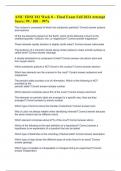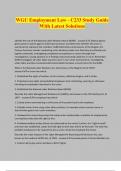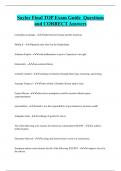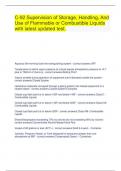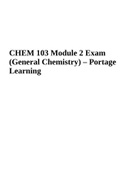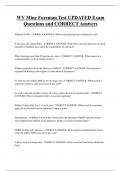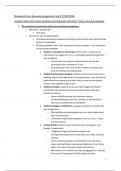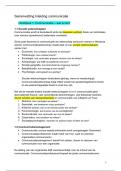Thomas More | Academiejaar 2020 - 2021
PERSOONLIJKHEIDS-
PSYCHOLOGIE
Maker: Mila Duerloo
,Inhoudsopgave
1. Inleiding ................................................................................................................................... 3
2. Dispositionele PHtheorieën....................................................................................................... 6
2.1 Wat zijn persoonlijkheidstrekken? ................................................................................................ 6
2.2 Identificeren van trekken .............................................................................................................. 7
2.3 Evolutie van trektheorieën ............................................................................................................ 8
2.4 Five-Factor Model.......................................................................................................................... 9
2.5 Five-Factor Theory | McCrae & costa, 1996 ............................................................................... 13
3. Persoonlijkheidstheorieën: Biologische Theorieën ................................................................... 14
3.1 Hans Eysenck ............................................................................................................................... 14
3.1.1 Biologische basis introvert vs. Extravert ............................................................................. 15
3.1.2 Biologische basis: neurotisch vs. Emotioneel stabiel .......................................................... 15
3.2 Jeffrey Gray (1934 – 2004) .......................................................................................................... 16
3.3 Robert Cloninger (1944 - …) ........................................................................................................ 17
3.3.1 Neurotransmitters & persoonlijkheid .................................................................................. 17
3.3.2 Temperamentdimensies....................................................................................................... 17
3.3.3 biologisch model | Cloninger ............................................................................................... 18
3.3.4 kritiek biologisch model Cloninger ....................................................................................... 18
3.4 Empirische Evidentie? | alle biologische modellen ..................................................................... 18
4. Persoonlijkheidstheorieën: psychodynamische theorieën ........................................................ 18
5. Persoonlijkheidstheorieën: Humanistische theorieën .............................................................. 28
5.1 Abraham Maslow ........................................................................................................................ 28
5.2 Carl Rogers................................................................................................................................... 28
6. Persoonlijkheidstheorieën: Sociaal-Cognitivistische theorieën .................................................. 29
6.1 Persoonlijke Constructtheorie | George Kelly (1905 – 1967) ..................................................... 29
6.2 Sociaal-cognitieve leertheorie ..................................................................................................... 31
7. Hedendaagse thema’s: Assessment van persoonlijkheid........................................................... 32
8. Hedendaagse thema’s: Cross-situationele consistentie & temporele stabiliteit van PH ............. 39
9. Hedendaagse thema’s: Gedragsgenetica & PH ......................................................................... 47
9.1 Het menselijk genoom................................................................................................................. 47
9.2 Controverse over genen & persoonlijkheid ................................................................................ 47
9.3 Doelstellingen van gedragsgenetica ............................................................................................ 48
9.4 Wat is erfelijkheid? ...................................................................................................................... 48
9.5 Gedragsgenetisch onderzoek ...................................................................................................... 48
9.6 Onderzoeksbevindingen .............................................................................................................. 50
, 9.7 Gedeelde vs. niet-gedeelde omgevingsinvloeden ...................................................................... 51
9.8 Genen & omgeving ...................................................................................................................... 51
10. Hedendaagse thema’s: Het zelf ............................................................................................. 52
10.1 Beschrijvende component van het zelf: zelfconcept ................................................................ 53
10.1.1. Ontwikkeling zelfconcept .................................................................................................. 53
10.1.2 Zelfschema’s ....................................................................................................................... 53
10.2 Evaluatieve component van het zelf: eigenwaarde .................................................................. 54
10.2.1 Zelfevaluatie ....................................................................................................................... 54
10.2.2. Onderzoek over eigenwaarde ........................................................................................... 55
10.3 Sociale component van het zelf: sociale identiteit ................................................................... 55
11. Hedendaagse Thema’s : coping ............................................................................................. 56
11.1 Wat is coping? ........................................................................................................................... 56
11.2 Coping Vs. persoonlijkheid ........................................................................................................ 58
12. Persoonlijkheid in het dagelijkse leven .................................................................................. 58
12.1 Persoonlijkheid & relaties ......................................................................................................... 58
12.1.1. Persoonlijkheid en partnerrelaties/partnerselectie .......................................................... 58
12.1.2. Persoonlijkheid en relatietevredenheid ............................................................................ 61
12.1.3. Persoonlijkheid en vriendschap ........................................................................................ 63
12.1.4. Persoonlijkheid en sociale media ...................................................................................... 64
12.2 Persoonlijkheid & school ........................................................................................................... 65
12.3 Persoonlijkheid & werk ........................................................................................................... 68
12.4 Persoonlijkheid & mentaal welbevinden ............................................................................... 72
12.5 Persoonlijkheid & lichamelijke gezondheid .......................................................................... 79
12.5.1. Theoretische modellen ...................................................................................................... 79
12.5.2. Stress ................................................................................................................................. 82
12.5.3. Coping ................................................................................................................................ 83
12.5.4. Type A persoonlijkheid ...................................................................................................... 84
13. Persoonlijkheidsstoornissen.................................................................................................. 86
13.1 Persoonlijkheidsstoornissen in DSM-5 ...................................................................................... 86
13.2 Prevalentie................................................................................................................................. 92
13.3 Etiologie ..................................................................................................................................... 92
13.4 Dimensionale benadering van persoonlijkheidspathologie ...................................................... 93
, Samenvatting
persoonlijkheidspsychologie
1. Inleiding
1.1 Definitie Persoonlijkheid
Persoonlijkheid is de verzameling van psychologische trekken en mechanismen binnen een
individu, die georganiseerd en relatief stabiel zijn, en die de interacties met en de aanpassingen
aan de intrapsychische, fysieke en sociale omgeving beïnvloeden
“Verzameling van psychologische trekken”
• Trekken (traits) = eigenschappen die verschillen/gelijkenissen tss mensen beschrijven
vb. iemand verlegen: een manier om te zeggen dat hij verschilt van andere extraverte mensen
vb. verlegen mensen zijn allemaal angstig in onzekere en nieuwe situaties
• Trekken beschrijven gemiddelde neigingen (average tendencies)
• 4 centrale vragen binnen PH onderzoek:
o Hoeveel trekken zijn er?
o Welke structuur heeft PH? (hoe zijn trekken aan elkaar gelinkt?/met elkaar in verband?)
Vb. Zijn er sign correlaties tss bepaalde trekken VFM?, Hoe is introversie gelinkt aan
verlegenheid, schaamte, & angst?...
o Wat is de oorsprong v PHtrekken?
o Wat zijn correlaties/gevolgen van PHtrekken? Vb. spraakzame mensen meer vrienden?
• Trekken zijn handig voor 3 redenen:
o Beschrijven, verklaren & voorspellen van (toekomstig) gedrag
“… en mechanismen”
• cognitieve processen van informatieverwerking | 3 onderdelen:
o Input bv. Je ziet dat een meisje lastig gevallen wordt
o Beslissingsregels ‘ALS… Dan…’: nadenken over opties die je hebt bv. Als je moedig bent, dan
denk je eraan om die persoon te helpen
o Output: gedrag sturen richting een actie bv. Persoon die meisje lastigvalt aanspreken
vb. Extrovert persoon zoekt opportuniteiten om met andere te praten => komt in wachtzaal en
kijkt naar opties voor interactie => gaat zitten bij een groep mensen
=> PHtrekken & mechanismen niet altijd actief bv. Enkel moedig in uitzonderlijke situaties
“… binnen een individu, die georganiseerd & relatief stabiel zijn”
• Persoonlijkheid = intern (iets wat je mee draagt: bepaald wie we zijn & hoe we ons voelen)
zorgt voor continuïteit
• Georganiseerd: geen willekeurige verzameling elementen, maar een coherent, samenhangend
geheel. combinatie trekken bepaald PH


